Dashnor Kaloçi
Memorie.al publishes the unknown story of how it became possible to publish the work “Andrra e Pretashit”, by Father Anton Harapi, which the author had originally published in “Hylli i Dritës” with the title: “Wisdom and man, among the mountain of Dukagjini ”and then with“ Wave on wave among the inhabitants of Cemi ”, which is 1941 the Institute of Albanian Studies in Tirana (where Harapi was one of the main leaders) asked to publish in a book alone and after he rewrote the work, entitled “Andrra e Pretashit”, it was sent for publication in Rome near the Publishing House, “Vallechi”, but due to the events brought by the war, that work was not published, but Her close friend, Father Zef Valentini, was able to take her from the printing house, which she later gave to Ernest Koliqi for safekeeping. In 1958, Koliqi handed them over to a group of Albanian Franciscans headed by Father Daniel Gjeçaj, who is also known by his literary names, Pal Dukagjini or Gjin Duka, and he made possible its publication in Rome. Among other things, in that work, Harapi described the severe cholera epidemic that affected the inhabitants of the villages of Dukagjini where he served as a priest in 1916, from which for a period of 5-6 months, 575 people died.
Full 62 years ago, a group of Albanian Franciscan clerics from the political diaspora gathered in Rome and undertook the preparation and publication of one of the best works of Father Anton Harapi, patriot, publicist, politician, writer and famous Catholic clergyman, who was shot by the communist regime of Enver Hoxha in 1946. Under the care of Father Daniel Gjeçaj, or as he is known by his stage names, such as Pal Dukagjini and Gjin Duka, some of Harapi’s former colleagues and students prepared and published in the Albanian language his work, “Andrra e Pretashit”, which was originally published a piece by piece in the magazine “Hylli i Dritës”, years ago. In that work of historical character, Father Antoni has carved and carved with a rare craftsmanship, particles from life and the wars of the highlanders of Northern Albania, mainly of the Dukagjini Highlands, where he had spent part of his life, serving as a priest. In the introduction of that book, Father Daniel Gjeçaj stopped and described in detail one of the most important parts of the life and work of Father Anton Harapi, who along with Father Shtjefën Gjeçov and Father Gjergj Fishta, is considered one of the most vocal representatives. , not only of Albanian letters but also of Albanian patriotism. Some parts of the preface of this book, the editorial office of Memorie.al has selected and are publishing in this article, as they are from the original, adhering to the Geg dialect, as the author wrote.
Foreword by Father Daniel Gjeçaj: The Man (Portrait of Father Anton)
I met him in my village when we were little villagers. I wanted him later, but he offered me a place to stay and replaced me with my father. I appreciated it more and more, the older I got, the clearer I understood it. I honored him with conviction as long as he was alive, and today I weep bitterly in the grave without the cross of religions, nor the stone of remembrance. In his jet he presented the viz-prime face of the distinguished Frati, the attractive example of the precious educator, the tireless worker full of humility and courage, the resting writer, and the ardent Apostle of the Nation. In the deck he appropriated the burner heroism of the first Martyrs. Until he spoke, he said: Man is made by the soul and conscience, represented by behavior, valued by work: The apostle is raised by ideal, endurance and courage: The benefactor is created by the heart – breadth, and self-denial. In front of the bullet that hit the ground, he uttered the phrase: Body not as high as they were tied. Easy to eat, like the hard spears of boats, which replace the cradle of childhood. Movable like the guys having fun as a kid. You have become like the mullet that his village enjoys. Stronger messy like white. Skin like baked by the sun beating dawn and dusk Shiroka. Together, but not too much. Wide and fragile forehead, more strongly square. Tamthat how to print with xigom t’heksuem. Eyes gac as in the groove, under the shadow of thick eyebrows. They entered the hill slightly broken, with sensitive leaves in May. The cheekbones of the vanished and cut cheeks from the wrinkles of the meatless main. Neither circumstance nor age compromised these visas. He did not add volume when the world said to him: He did not grieve when his friends complained to him: “Woe to you for what you are suffering!” The inhabitants of the northern mountains called it “Thancan”. The typical “Shirokas” were named after the ones who beat him. He did not deny in the village where he was born: a little in the city that raised him. He remains a resident of the burning slope of Tarabosh. He loved the mountain and the water that was his lymph. (Horizon) the first of life. These external body visas, he presented. At first we saw you, more stubborn than sweet. Gaspëri, that this is how he was shot in the childhood-son of a fisherman, became Father Antoni. The more serious in action, the happier in fun. The company in him repeated the powers and opened his heart. Here Father Anthony forgot who he was. He returned to his village without remembering, and his face was smiling, a heavy shadow like the happy fellow countrymen from the smell of mullet on the brick and the rakia boça on the salary, on the red sofrabeztën, with Kraje cheese, dried fish eggs, and Zadrime peppers, baked over charcoal.
Priest
Little Hini at the Franciscan College after enjoying that of the Jesuits, where he left his volume, Mark, whom he loved so much. They did not pull the strings, which, for the sake of the gods, adorned the vest under the shadow of St. Saver. He desperately wanted to humiliate Frat without any fuss. His white, white-haired brothers did not hurt him more than the lakes of the lake, nor the red carcasses, nor the purplish tuft that covered his small shoulders. He left these and put on the rough robe, squeezed the rope, accepted the barefoot leg. Peers, new colleagues, waited until they agreed with the name of the law. They did not even try to bring them with the second name of the brake. They always called him “Shiroka”. He continued to sing in the country under the direction of Fishta, from whom he absorbed his love for the province, for the people and the nation. He reconciled his mind and ennobled his heart with the priestly culture under the leadership of the Austrian friars of Tyrol, who always valued the Albanians and supported them as brothers. There in Salzburg eh Thchaëaz “Shiroka”, as far as I know, won the German punctuality, endurance, and the Franciscan spirit. He became a lottery priest with the momentum of the Albanians and the Nordic descent. Two currents clashed in the fraternal troll of Shkodra: the first group with Bosnian education with Fishta, Bardh, and Gjeçov, the second group with Austrian culture, with Prendush, Harap, Rrotë e Gjokë. They were not swayed by the winds as they were swept away by the raging rivers to which they appeared. Activities such as the return waves of the Cem with the water of Moraca in Lake Shkodra are mixed with intermittent watering. In 1910, Gaspri of Lora and Çile, Father Anton, Shiroka Frat, Apostolic Brother, handed over the Franciscan youth. Teach children in the city of Shkodra. The siege of Shkodra (October, 1912-April 1913) occupied the Assembly of the Great Nut, on the other side of the city. The fraternal apartment turns into a shelter for citizens and a mahogany for the needy. Water narrows residents Këlkazat ends. The burdock nuts disappear, the snake bites and the pickles become the food we are looking for. Few people manage to disturb the boiling water with bran. In six months of resistance, the meat of the horses returned to service by Montenegrin cannons and heroism Hasan Rizaja is sought after as an appetizer. In this case, my brothers, Father Anthony, never reveal themselves, the angel, Alexander Mazoni in his novel “The Engagements”, says: “The Franciscans are like the sea, which takes water from the rivers and the same water, returns it ”
Albanian humble
It would be a denial of the truth if we opposed Harap as the emphatic ideal of Albanians. He embodied this ideal under the silence and suffer the Franciscan. He started his activity as the right-wing of Fishta, Gjeçov, Bardhi, Doda, Prenushi, with which he baked the oven of patriotism. He hid himself in their shadows and blessed them to lead them, and he followed them. He worked closely with Gurakuqi, who was accompanied by his husband and acting. It was the first qi bani to sound “Ora e Maleve” and to dawn “Hylli i Dritës”, over Albania in the dark. He himself chose the tranquility of the darkness to be freer at work. Today, Harapi’s biography is narrow. On the numerous sheets of arbnore letters, you find little on it. The vivid memories, in the homeland, are silenced in the catacombs, where rotten cobwebs rot to disappear. The castle of the greats always leaves its indelible traces. In these traces people are distinguished. It was 1918 when the North whispered a name and we slandered it for good, why do you live well in the eight days after the war. He did not fire a rifle or fire a cannon. He gathered around himself the highlanders of the highlands and said to them: “The journey of gunpowder is extinguished by the rocks of the mountain”, among them the ringing of the protest is heard by the rooms of the powerful, the leader and elder of the people’s grafts. The brave Hoti, the brave Traboini, the wise Gruda, and the brave Triepshi, poured into Shkodra with Father Anton Harapi at the helm. They are looking for a free Albania and in Albania their three bajraks, shook the buildings of the city of Ghent from the song “Majekrahit”, and the legendary money: “Hot and Grud were sworn o bloodless mountains do not let them go”. The French general of Shkodra trembles because he did not know what is the honor of Albanian weapons. Zara i Harapit hides under the wings of highlanders, decorated by the learned hand of Gurakuqi and Fishta, echoes in Washington and London, Paris, and Rome. “Shqypnis Post”, closes with an Albanian name for Harap’s last time.
Oratory
Father Anton Harapi, while alive, became known among the best poets of Shkodra. He did not allow it: He became obsessed with endurance after a long experience. It lacked many external features that lecturers find appealing and appealing. He filled these voidings of his with his psychologic and heartfelt spirit, with his eloquent speech, clarity, and clarity of thought, with the connection of reasoning and the force of expression. He informed the soul of the Albanian in a little while and he looked at it in his own hands, every time he spoke to him and made him know how he wanted to match himself and I started to deal with his heart. His oratory took place, for the most part, in the priest’s cathedral as a church preacher. This is what the most eloquent always said. The city of Shkodra devoured his words and the mountains stared at him, whenever he talked from the floor or log of assemblies. Father Anon’s mouthpiece was not dry, most notably on the cathedral’s cathedral. He filled this with the listener always spoke. The city of Shkodra devoured his speech and the mountains looked at him with amazement, he talked everywhere from the floor or log of assemblies. Father Anthony’s speech was not dry, a philosophical lesson can be learned about an immature environment. He knew how to keep them in the shells that you live in, and these were many and always different constraints of reasoning, which does not allow you to play, with the masterful adaptation of principles in practical life. Perhaps here more than one, the oratorios-harapjane skill should be sought. Hence the word practical and attractive duel. He never tired the listener.
Writer
Harapi that he kept himself a writer. The need, perhaps stronger than the other, prompted him to grab the pen without having to go out literary. He never wrote just to please the reader’s ear, nor just to have fun. He wrote with a much higher purpose, to rebuild. The observer leaves to the spiritual feelings, examined with the weighted weight carried by the psychologist to rest the soul of the Albanian and there until the thalb of an old civilization together with the rest of the time. It was therefore written to treat the soul of the Albanian and to encourage the compatriots towards a national ideal of the new currents, qi, the Albanian, in mourning, they attracted him to an ocean of ideas without being able to distinguish between support and the field of occupation. sure. This was the purpose of Harapi’s writings (see “Albanian Writers”, Published by the Ministry of Education, Tirana 1941, part II, p. 389, Anton Harapi). He wrote at once in prose with a slow, inconspicuous, fluent style. Simple. Unfortunately, the lack of Harapi’s manuscripts, like many of his articles published in the “Post of Albania”, and in the “Hour of the Mountains”, and later in the “Zann of Shnandout”, does not allow us to make a suitable analysis on his literary works.
Martyr
The weapons of the brave soldiers burst through the heat of the additions, alone, after five years of resistance. The Germans waged war. It broke in front of the world on its feet to extinguish Hitler’s tyranny. They withdrew from the Balkans and crossed our country, which they wanted to have as a friend, but not a property of profit. Albania experienced the anarchy gained by the false promises of the victors, by the incitement of enemies, by the fratricidal war, by the sons we lied to, by the bloodthirsty warriors, who begged for the help of the foreign star, not the gain of Albania. himself, by the conscious traitors, who unjustly pardoned most of the country, to seize the seats of servile rule. In anarchy, the uncertainty of fate always fluctuates, the danger of life is threatened. Harapi is advised to leave. They make the means available. Friends and acquaintances, lovers and relatives, try to break it. He stays. I worked for face-to-face Albanian. I do not expect a reward, but the punishment does not have to wait for me. My compatriots know that I never betrayed them. I suffered with them, I worked for them, I rejoiced with them. I will die with them. “My bones are in the land of the First”, to be my testament. He retreats from the center where the ruins of the war surround him, the storm disappears like the one who hugs his head in the oak without seeing that the narrator shoots more strangely there. Accommodation is required in the mountains of the North, the Dragobia horn of Curri. He does not take up arms, nor does he carry a hand grenade. They leave straws and handbags that you never blow. He did not accept anyone’s request.
Executed on February 14, 1946
Almost a year passes between caves and forests, with wild goats and goats waiting for the storm to dissipate. On the contrary, the storm was getting worse every day. Vampires with a forehead and a thirst for blood in their hearts are looking for human corpses. Not even the sacred tombs, which every nation in the world honors, are spared. They beg for the blood of the brother. They are looking for Father Anton Harapin. They find it. Red partisans descend around him. And they dance with joy and in the Slavic cough like the hungry Siberian wolves around the “troikas”, unarmed. They put him down in Shkodra, which had already turned into a lake of blood. They send him to Tirana in front of the new Nero, for him to present with friends in the arena of the Martyrs of the Nation. We are in early February 1946. Harapi was on trial. From the bank of the accused, he speaks to the Albanians and not to the illegal judge, for the last time as much as they are allowed: “If you listen to the divine laws of the Homeland, educate the youth and the people towards the lofty ideals of I urge the truth to be good: if it is for the sake of the people and the people and for the sake of religion and Atme, it is a weak and treacherous work, then not only me but all the Franciscans of Albania are in a state of despair ”. February 14 dark with blood. Harapin and the bar in an unknown place. The beast also dwells with the body of the robber from the herd of lords. A battery of bullets knocked him to the ground.
Father Anton Harapi every day among the highlanders who gave spirit
In the preface to Father Anton Harapi’s book, “Andrra e Pretashit”, among others, Father Daniel Gjeçaj (or as he is otherwise known by his literary name, Gjin Duka), has described Father Anton’s great contribution in 1916, to help the highlanders of Dukagjini affected by cholera. Regarding this, in the book in question, it is written, among other things: “In the spring of 1916, the mountains of the North, and especially the Dukagjini Mountains, are devastated by cholera. Legendary towers of giant towers are torn. Families are wiped out and lands are dug under the scourge of global liquidity. The weapons of the mountain dwellers have been melted down under the horses, and the noblewomen in the jubilee are being slaughtered, the excess among the dry rains of the cruel oaks. The water drains the children’s wet eyes and the men’s loggias and the courtyards of the towers and the crevices of the walls are covered with the deco. The Shala Church register alone records 575 deaths from cholera from April to autumn. Father Anthony, at the best age of his life, volunteered for the college. He forgets that the liquid is contagious and that it opens like snake venom on the wet body of the one who eats it. Disappear, and do not be led astray by the consolation of those who despise mankind. He is not afraid of the deacon, nor is he afraid of the sacrifice of the Companion of the Order. Father Rrok Vataj, who has been in prison for 31 years (Kelmend, August 4, 1916) Theth, Ndërhysaj, Kaprrae, Gimaj, Lekaj, and Curraj, is the lama of Harapi’s summer action. Only those who know these places can judge how possible and open the field of apostasy was. He himself shouts: “We got up at night. From Theth’s castle we followed the predetermined plan of the journey. There was a knock on the door, half-open, of the towers, of the classrooms of the bay, from where a Taft of bodies in disarray, of lives in order, came out. The hooves of the hove and hove, like those coming from the subterranean, tore me inside. Rop still took him untouched by the disease, instead of shouting at me: “Lord, for God’s sake, don’t cross the door, because you’re getting dirty.” We did not look at what they were telling me. The Lord had given me every fear. A joy that could not be expressed, but that was experienced in such cases, pierced my heart. The lips that were barely playing, the bells that were barely audible, the wings drowned in human prose, were directed towards me: “Blessed are you that God has brought you. We want to agree with Lumni and agree with the soul. They often tried to cross the river with their hands behind their backs. What comfort ?! Two months of service were like wind, full of comfort and joy. We seldom went back to the Theth center castle to rest. The body did not tire at all, but my heart was drawn to the sick. That was the most beautiful time of my life – Frati concluded.
Father Zef Valentini and Ernest Koliqi preserved the books of Harapi’s book
According to Father Daniel Gjeçaj, in 1941, the Institute of Albanian Studies, where Father Anton Harapi was one of the main leaders, decided to publish a series of original works by various Albanian authors dealing with historical documents, folklore studies such as and Albanian literature. Among these works was the publication of Father Anton Harapi’s book “Andrra e Pretashit”, which was asked to rewrite it and make it ready for submission to the press. On that occasion, Father Antoni reviewed his work, which was first published years ago in “Hylli i Dritës”, entitled “Wisdom and man, among the mountaineers of Dukagjini” and then with the title “Wave on wave, among the inhabitants of Jam ”. Harapi edited these two works and from them came the book “Andrra e Pretashit”, which the Institute of Albanian Studies (with the original manuscripts of Harapi), sent for publication at the Publishing House “Vallechi” of Florence in Italy. But while the book was about to go out of print, the events of the war caused work to be stopped at that publishing house, and Anton Harapi’s work did not see the light of day. All the remains that remained in the Publishing House were preserved by the famous researcher and, Father Zef Valentini, who then gave them to Ernest Koliqi, one of Harapi’s closest friends, for safekeeping. After 15 years, Koliqi handed them over to Father Daniel Gjeçaj, who at the head of a group of Albanian Franciscans in exile, took over and published in Rome the book, “Andrra e Pretashit”./Memorie.al






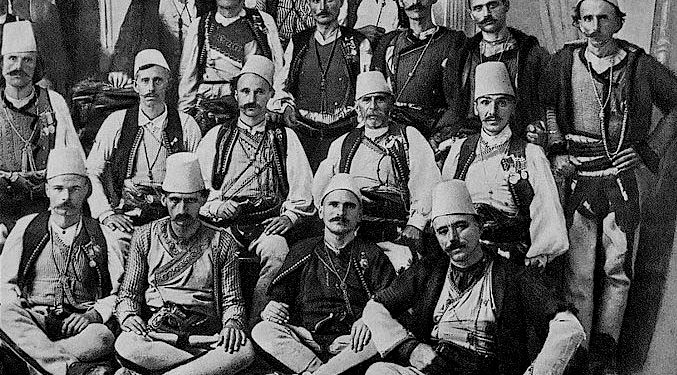

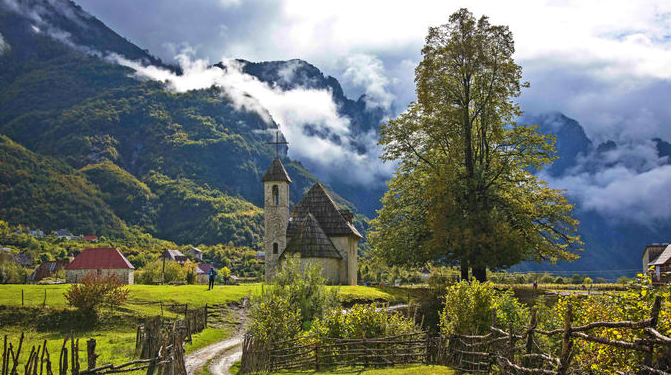


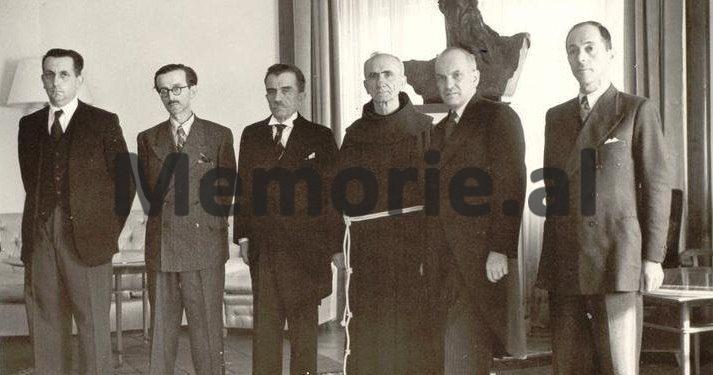
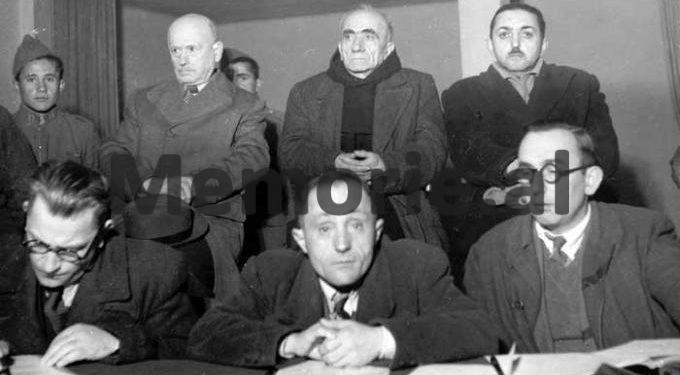
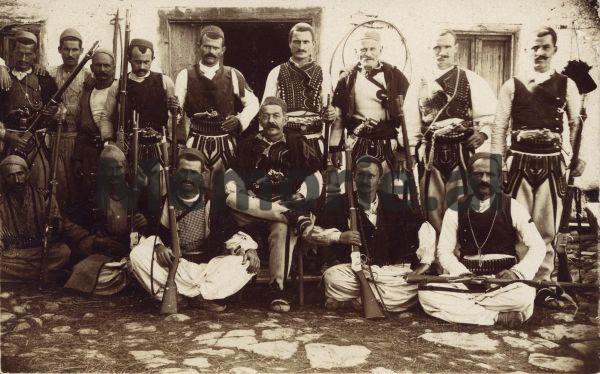
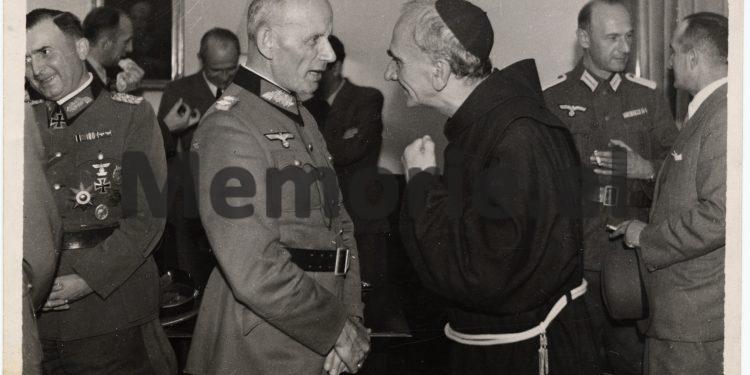
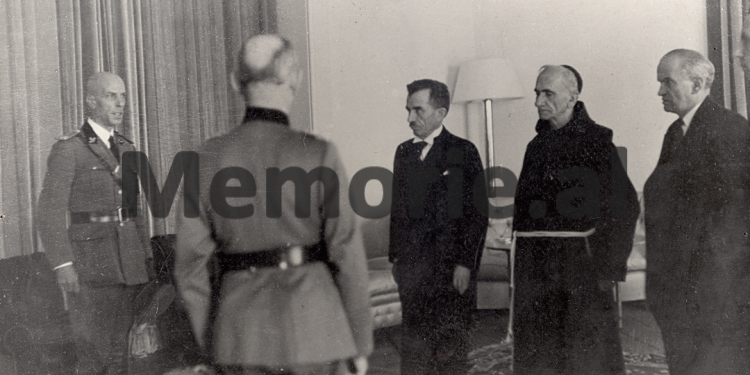
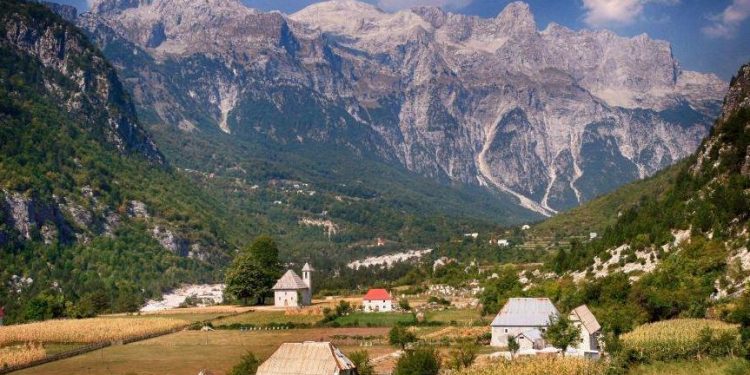
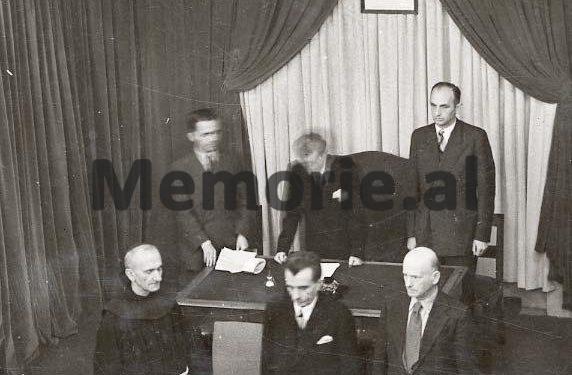
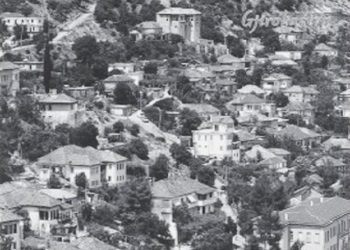
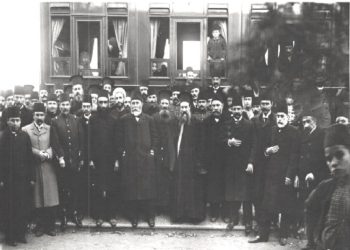
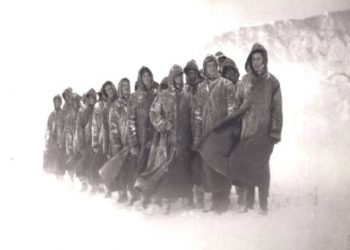

![“When the party secretary told me: ‘Why are you going to the city? Your comrades are harvesting wheat in the [voluntary] action, where the Party and Comrade Enver call them, while you wander about; they are fighting in Vietnam,’ I…”/ Reflections of the writer from Vlora.](https://memorie.al/wp-content/uploads/2025/06/admin-ajax-4-350x250.jpg)

